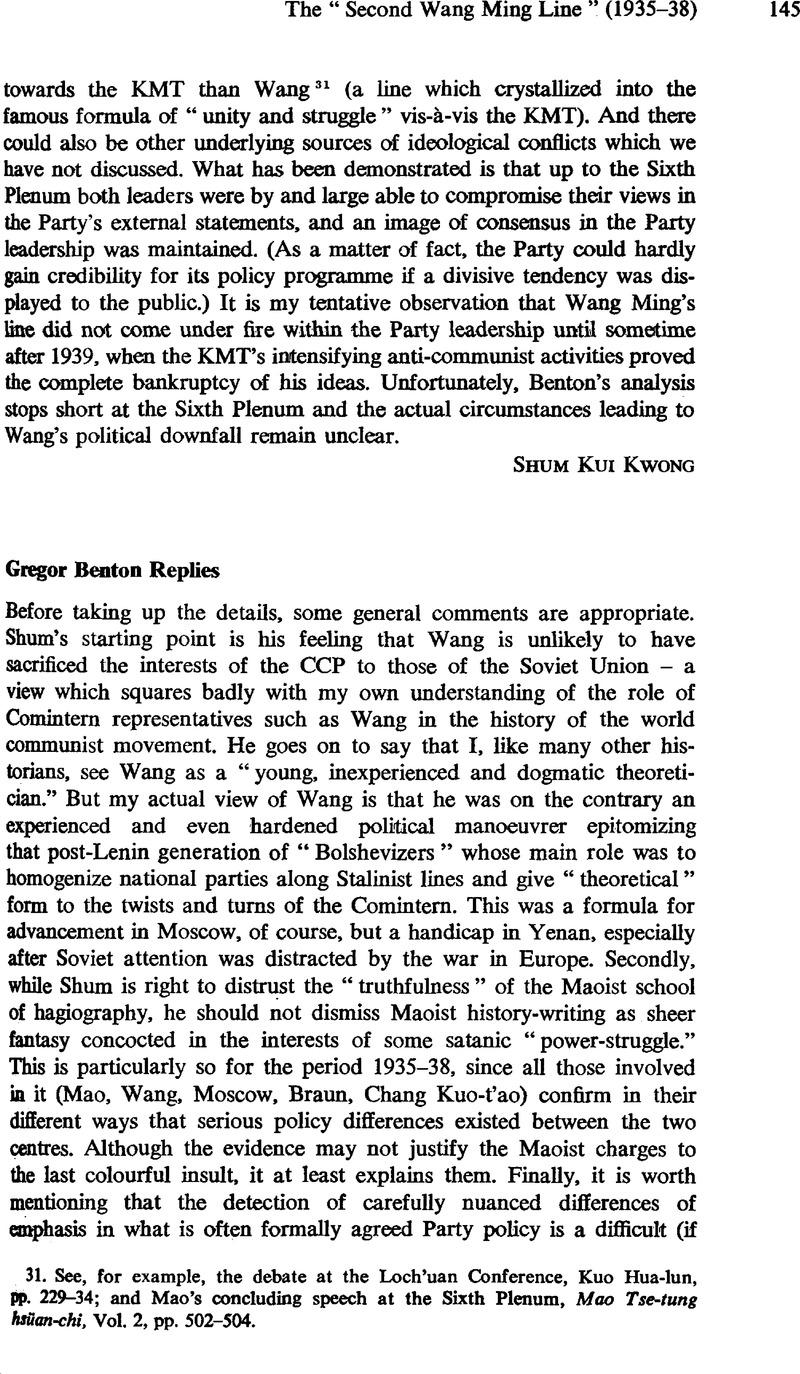No CrossRef data available.
Published online by Cambridge University Press: 17 February 2009

1. WMHC, Vol. 4, pp. 269, 308–309, 390 and 405; MTTS, Vol. 5, pp. 24 and 32–33.
2. Braun, Otto, Chinesische Aufzeichnungen (Berlin: Dietz Verlag, 1973), p. 233Google Scholar; MTTS, Vol. 5, p. 57; WMHC, Vol. 4, pp. 433–41.
3. Feng, Shih, Fan-tui Wang Ming t'ou-hsiang chu-i lu-hsien ti tou-cheng (Shanghai: Jen-min ch'u-pan-she, 1976), p. 12Google Scholar.
4. Kokusai, NihonKenkyū-jo, Mondai, kai, Chūgoku-bu, Chūgoku kyōsantō shi shiryō shu (Tokyo, 1974), Vol. 8, pp. 252–80Google Scholar. There is an even earlier mention of the democratic republic in Mao's July 1937 interview with Snow (China Weekly Review, 14 November 1936), but this may have been edited into the text at a later date.
5. WMHC, Vol. 4, pp. 23 and 26 (horizontal) and Vol. 1, p. 144; Benton, p. 70.
6. Heng-yü, Cited in Kuo, Maos Weg zur Macht und die Komintern (Paderborn: Ferdinand Schöning, 1975), p. 86Google Scholar.
7. Kuo, Warren, An Analytical History of the Chinese Communist Party, Vol. 3 (Taipei: Institute of International Relations, 1970), p. 230Google Scholar.
8. Quoted in McClane, Charles B., Soviet Policy and the Chinese Communists, 1931–1946 (New York: Columbia University Press, 1958), p. 94Google Scholar.
9. Braun, p. 268; Tse-tung, Mao, Selected Works (Peking: Foreign Languages Press, 1964), pp. 268 and 288Google Scholar. Note, however, that several weeks after the KMT Plenum the CCP circulated an internal memorandum conceding that the KMT's four conditions were close to the CCP's, own February proposals (Chūgoku kyōsantō shi, Vol. 8, p. 387)Google Scholar.
10. WMHC, Vol. 5, p. 108.
11. Ken'ichi, Hatano, Chūgoku kyōsanto-shi 1937-nen, Vol. 7 (Tokyo, 1961), p. 472Google Scholar. I tend to accept Belden's report as authentic (a) because the disparity between it and Wang's “official” version is so great that it is unlikely to have been due to a minor error of translation or transcription and (b) because it would seem to be independently confirmed by the Maoist charges against Wang.
12. Shih Feng, ibid. p. 31.
13. K'ang-Jih min-tsu t'ung-i chan-hsien chih-nan, Vol. 3 (Yenan, 1939) p. 3Google Scholar.
14. Vladimirov, P. P., China's Special Areas, 1942–1945 (Bombay: Allied Publishers, 1974), p. 136Google Scholar. Forgery or not, these diaries undoubtedly reflect an official Soviet viewpoint.
15. Braun, pp. 301–308.
16. September 1938, Vol. 15, no. 9, p. 869.
17. WMHC, Vol. 5, p. 112.
18. Shih Feng, pp. 39–45; WMHC, Vol. 5, p. 162. It should be noted that the battle area around the KMT's temporary capital was in turmoil and confusion, with armies and whole populations on the move and no stable military or political authority.
19. Cf. WMHC, Vol. 5, p. 57.
20. WMHC, Vol. 5, p. 322. Shum does not appear to be aware of the existence of this important article.
21. Min, Van, Polveka KPK i Predatel'stvo Mao Tse-duna (Moscow: Izdatel'stvo politicheskoi literatury, 1975), pp. 76–78Google Scholar.
22. WMHC, Vol. 5, pp. 321–22.
23. WMHC, Vol. 1, p. 249; Kuo, Vol. 3, p. 334; and Braun, p. 306.
24. Braun, p. 324.
25. MTTS, Vol. 6, p. 224.
26. MTTS, Vol. 7, p. 74.
27. Bisson, T. A., Yenan in June 1937 (Berkeley: University of California, 1973), p. 53Google Scholar.
28. Vladimirov, pp. 63–64; Ming, Wang, China: Cultural Revolution or Counter-Revolutionary Coup? (Moscow: Novosti, 1969), p. 46Google Scholar.